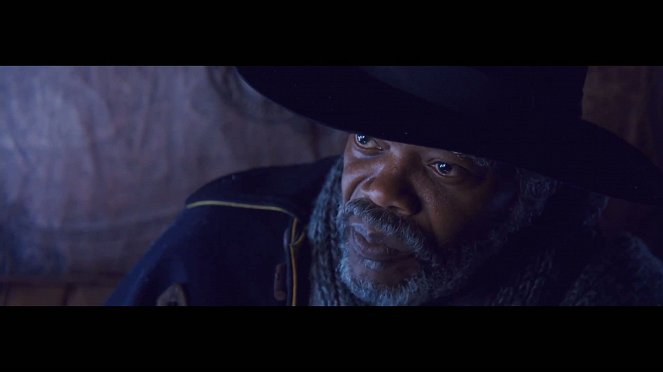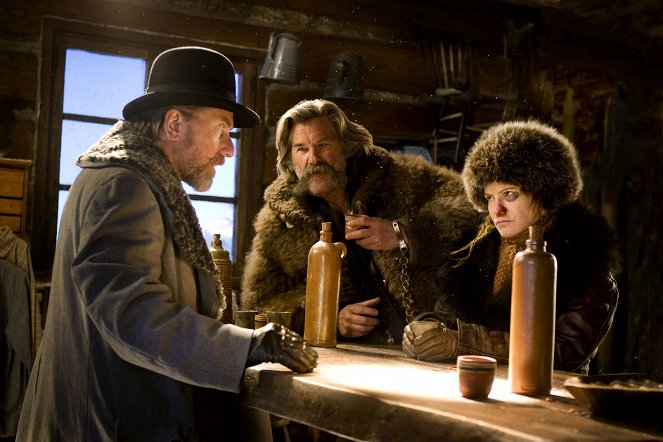Director:
Quentin TarantinoGuión:
Quentin TarantinoCámara:
Robert RichardsonMúsica:
Ennio MorriconeReparto:
Samuel L. Jackson, Kurt Russell, Jennifer Jason Leigh, Walton Goggins, Demián Bichir, Tim Roth, Michael Madsen, Bruce Dern, James Parks, Dana Gourrier (más)Streaming (2)
Sinopsis(1)
Seis, ocho o doce años después de la Guerra de Secesión, una diligencia avanza a toda velocidad por el invernal paisaje de Wyoming. Los pasajeros, el cazarrecompensas John Ruth (Kurt Russell) y su fugitiva Daisy Domergue (Jennifer Jason Leigh), intentan llegar rápidamente al pueblo de Red Rock, donde Ruth, conocido en estos lares como "el Verdugo", entregará a Domergue a la justicia. Por el camino, se encuentran con dos desconocidos: el mayor Marquis Warren (Samuel L. Jackson), un antiguo soldado negro de la Unión convertido en cazarrecompensas de mala reputación, y Chris Mannix (Walton Goggins), un renegado sureño que afirma ser el nuevo sheriff del pueblo. Como una ventisca está a punto de alcanzarlos, Ruth, Domergue, Warren y Mannix se refugian en la Mercería de Minnie, una parada para diligencias de un puerto de montaña. Cuando llegan al local de Minnie, en lugar de recibirlos su dueña, se topan con cuatro rostros desconocidos. Bob (Demian Bichir), que se ocupa del negocio de Minnie mientras ella visita a su madre, se encuentra allí refugiado junto con Oswaldo Mobray (Tim Roth), verdugo de Red Rock, el vaquero Joe Gage (Michael Madsen) y el general confederado Sanford Smithers (Bruce Dern). Mientras la tormenta cae sobre la parada de montaña, nuestros ocho viajeros descubren que tal vez no lleguen hasta Red Rock después de todo... (Entertainment One Films Spain)
(más)Videos (36)
Reseñas (17)
Un comienzo más débil y bastante largo. Pero tras él, un hard core tarantino por excelencia. Una ingeniosa obra de teatro con las expectativas del público y reminiscencias de Reservoir Dogs y La cosa de Carpenter en un abrigo wéstern (con tres canciones distintivas tomadas de la banda sonora, un entorno aislado de invierno helado, la escena de exponer al culpable de sus propias filas...). Y gracias al siniestro Morricone, también la más oscura, más odiosa que Tarantino, más odiosa que Reservoir Dogs. Samuel L. Jackson, dando vida a los rasgos de su personaje de más culto, Jules Winnfield, es probablemente el actor más genial de la actualidad. ¡Quentin sabe que puede hacer lo que quiera y siempre lo atacaremos!
()
U Osmi hrozných mě stále dokola napadá jeden zásadní problém, který ale u Tarantina problémem nebývá - délka. Díval jsem se asi napětkrát. Kdyby se vypustily žvásty v dostavníku a několik žvástů ve srubu, byla by z toho svižná westernová detektivka s pořádnými grády. Tímhle neskutečným natahováním se filmový zážitek proměnil ve věčné čekání na nějakou akci nebo dějový zvrat a já jako divák jsem byl už tak unaven tím věčným čekáním, že se nedostavilo ani uspokojení ani docenění autorovy snahy. Možná jeden z nejslabších Tarantinových snímků.
()
The Hateful Eight is a great Tarantino revival and, after a long time, a film for which I would not regret paying a higher ticket price (though I’d still rather pay more for a screening from a 70 mm print). Faces familiar from Tarantino’s previous films, a return to the intimate “whodunit” concept of Reservoir Dogs (despite the epic establishing shots and imaginative use of spatial partitioning, which best stand out on the big screen), references to its own universe (Red Apple tobacco), division into chapters (which, in addition to rhythmising the narrative, serve to reveal new information and redirect the viewer’s expectations), the non-chronological organisation of the narrative (which doesn’t break up the film, but contributes to its overall integrity), visual and motif references to spaghetti westerns (Jackson stylised as Lee Van Cleef) and John Ford’s westerns, as well as to (slapstick) splatter flicks and Carpenter’s The Thing, variations on narrative formulas from blaxpoitation and samurai films, not individual scenes but almost the whole film based on waiting (ours and the characters’) for something to happen (and when something finally does happen, there is – in the roadshow version – an intermission followed by a flashback with Godard-esque commentary) and whether it turns out at the end that some of the characters were connected to each other by something other than a chain. The constant delaying of action and the use of dialogue to draw out scenes of simple actions, which the aforementioned Godard enjoyed using to test the patience of his viewers (see the magnificently retarded scene from Breathless with Belmondo and Seberg blabbering in a hotel room) make The Hateful Eight a unique film not only in the context of contemporary Hollywood production, which offers viewer satisfaction much more quickly, but also in Tarantino’s filmography. The first half of the film is not just a sadistically long prelude. The director uses various delaying tactics from beginning to end and even lets the characters provocatively point that out (“Let’s slow it down”). Regardless of the large number of identified (self-)references, this is a masterfully written and acted film in which everything elegantly clicks into place in the end; it just intentionally takes longer than would have been necessary, which would seemingly work as well only as a stage play (the film is aware of its theatrical structure and thematises it with gusto). Most of the characters play a certain role and the film derives much of its tension from the characters/viewers not knowing who is pulling which end of the rope. Though basically everyone is a lying bastard (those who aren’t won’t survive long), your sympathies will constantly shift from one character to the next depending on what Tarantino reveals about them. As much as to the detailed distribution of power (consisting not only in who has a loaded gun in their hand, but also in who knows what – see all of Chapter Four), the film owes its dynamism to the fast-paced dialogue, the energetic acting and camera movements (drawing our attention to important motifs), the lighting, the refocusing, the work with the depth (height and width) of the space and the editing (taking into account who is looking at whom and how). Even more than Django Unchained, The Hateful Eight would like to be a political allegory in the style of the subversive counterculture westerns of the 1970s, using not very sensitive means to draw attention to the parallels between racism and capitalism. The literalness of the film’s ideological level (lines like “When niggers are scared, that’s when white folks are safe”, the division of the bar into individual American states) contrasts with the much more subtle means by which Tarantino builds tension, creates an oppressive atmosphere of distrust and communicates essential information about who is an ally or an enemy. Even so, this is a brilliant allegory that offers very disturbing and not entirely unambiguous commentary on a different interpretation of law and justice. Tarantino has made an extremely nihilistic western that successfully creates the atmosphere of an era in which people are united mainly by their hatred of a common enemy. Primarily, however, it abounds with the narrative skill of the best Agatha Christie novels. I believe that, like Christie’s books, The Hateful Eight will only get better over time. 90%
()
(menos)
(más)
A self-indulgent massage of the creative ego, which has grown to manic proportions in the use of epic cinematic toys (Ennio, 70 mm, Nicoreto), all whilst covering itself for three hours with a banal story that commits obscure suicide in the form of the chapter "Earlier that morning," destroying the last vestiges of credibility. The much-maligned first hour is in no way useless, and the snow rascals couldn't have gotten better casting (all of them amazing, but Goggins' Mannix undergoes the most interesting evolution of audience sympathy). Thus, even if common sense starts to politely resist it after all the grand circles, Tarantino proves again how cheap of a whore the audience can be at times and gets hooked by banalities we'd long ago boo others for. If, in the end, you accept the fact that the absence of Quentin's traditional absurdist humor is actually a good thing, you're going to like the film. 4 ½.
()
I'm sick and tired of the over-the-top violence in Tarantino's films, and I write this as someone who enjoys Fulci and similar masters of horror gore. Unlike most, I enjoyed the first hour more, with the witty dialogues that, if fleshed out to a greater scope, would have made a fine play. But then Quentin breaks free with his explicit bloody charge and it all goes to hell. This is a symptom in all his recent films, you know exactly what is coming in the next few minutes. Moreover, as the story unfolds, it makes less and less sense, with a verbal diarrhea that feels unnatural thrown at the viewer. Would real characters talk this mechanically? I still can't get enough of Pulp Fiction to this day, it's a masterpiece where everything clicks, but ever since Kill Bill, which was Tarantino's last great film in my eyes, his work has become more and more distant. There's no longer any excitement on my part, just cautious curiosity, and that's a shame.
()



Anuncio